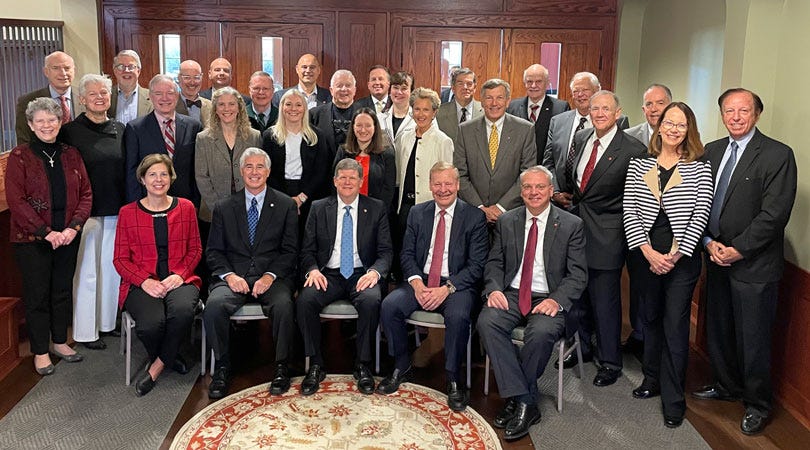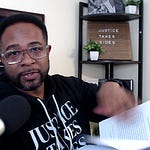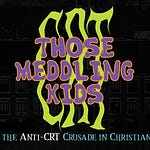To the Board of Trustees at Grove City College,
I write to you with a heavy heart and with hope. I am heavy-hearted because I was dismayed to learn of your decision to officially accept and adopt the "Report and Recommendation of the Special Committee" generated by your sub-committee concerning supposed "mission drift" at the school because of racial justice education.
With your vote, that report has now become the official stance of the Board of Trustees of Grove City College; I am thus compelled to issue this response.
Yet I am hopeful because while we yet breathe we still have the chance to change. My prayerful ambition is that this letter will provide additional encouragement for you as leaders of Grove City College to rescind the report and take meaningful action in support of racial justice.
Background of the Issue
In October 2020, I traveled from my home on the Arkansas side of the Mississippi Delta to Grove City College. At the invitation of some faculty and staff, I gave a chapel presentation, met with students of color, met with the now defunct Advisory Council on Diversity (with the college's president in attendance), and gave a talk in the evening about my book The Color of Compromise: The Truth about the American Church's Complicity in Racism.
Throughout my time on campus, I found the students respectful, engaging, and inquisitive. Although some, it was clear, did not agree with my statements about racism, they did not seem to harbor any animosity while I was present.
Imagine my surprise when over a year later a group of concerned “parents and former students" wrote a petition entitled "Save GCC from CRT" and named my chapel presentation as one of the instances of mission drift and the promulgation of Critical Race Theory.
You call the creation of this sub-committee and its report "extraordinary." Indeed it is extraordinary in the attempt to officially and comprehensively impede racial reconciliation and racial justice at the school.
Three Preliminary Notes
First, I have never written an open letter to a college's leaders. I am used to receiving criticism. Unfortunately, when the topic is racial justice, there are always those who push back and prefer to ignore or underplay the crisis of racism in the church and the nation. Typically, however, such disagreement comes from individuals. It is rare that resistance to my stances on racial justice rise to an institutional level.
In the case of Grove City College, President McNulty chose to publicly respond to the initial petition, and you, the Board of Trustees, appointed a sub-committee to look into the matter of allegations of teaching what you labeled Critical Race Theory at the school. Since you took a public stand against me and my work, I have chosen to take a public stance in my defense.
Second, I am not a critical race theorist. I say that out of respect for the scholars and experts who have devoted years of their professional study to learning about and developing this theory utilized most often in legal studies.
I am a historian. My assessments of race in the United States come from long hours in the archives searching primary sources, reading hundreds of books on the subject, and writing hundreds of thousands of words about racism and how we can promote racial justice.
Third, I write this letter in the spirit of open dialogue and from a desire to see a Christian institution disrupt the sordid history of racism in the U.S. church. I harbor no animosity toward any individual, but I see the need and opportunity for institutional change in order to honor the dignity of people from every racial and ethnic background. My words are intended to "speak the truth in love" that the Body of Christ might grow (Ephesians 4:15).
Some Problems with the Report
I will not go point-by-point through all of the inconsistencies and inaccuracies of the report. It did trouble me, however, that you cite my chapel presentation as problematic and called it a "mistake" to invite me to speak on that occasion.
Yet in the report you reference not a single word or sentence from my 21-minute message. Your silence on the matter leaves the impression that the real issue for you is not how I spoke about racism but that I spoke about it at all.
In the absence of any definitive evidence of my supposed un-Christian views, a public apology for misrepresenting me is in order. The injunction from the Ten Commandments about bearing false witness requires that any misrepresentation--whether intended or unintentional--be publicly corrected (Exodus 20:16).
Far beyond the personal attacks on the integrity of my work, your report, sets a harmful example for your students and other Christian colleges and universities.
By adopting this report you imply that honest dialogue about race and earnest efforts to promote racial justice are somehow un-Christian. You curtail the dialogue and learning that is essential to addressing one of the most pressing church and social issues of our day.
As I write this letter, only a few days have passed since a white supremacist targeted a supermarket in a majority Black community and killed 10 people, all of them Black, in a racial terrorist attack.
At the very moment when people should be fighting against racism, you are making it harder for them to acquire the knowledge to do so.
With this report and its recommendations you send the message that only the most superficial and vague statements about race are acceptable, and you leave your students under-equipped to fight against the present and violent scourge of racism in the land.
Faith Without Works Is Dead
Justice takes sides. If you claim to be on the side of Jesus then you must be on the side of justice.
We can differ as to means and tactics, but what should not be up for debate is the dignity of people of all races and ethnicities as those made in the image of God.
I expect you will agree in principle that we all have equal dignity, but your actions belie your stated beliefs.
James says "faith without works is dead." In the same way, rhetoric without action is bluster.
In the section titled "Remedial Actions" you make every attempt to undermine any campus efforts to promote racial progress.
You replace a class on diversity and advocacy and require professors to justify their courses based on alignment with the school's mission and vision. You require all resident assistant training materials to be reviewed under an unspecified process. You describe the Advisory Council on Diversity started in 2020 to help with minority recruitment and retention as "having served its limited purpose" and is now "defunct."
You "reconstitute" the Office of Multicultural Education and Initiatives (an office of just one person) and strip it of any meaningful power. You subject the selection of chapel speakers to "increased scrutiny." And you encourage the college president to address any perceived mission misalignment among faculty (who labor under one-year contracts) to take "appropriate actions."
All of these actions serve to block the progress of racial justice on campus and create a climate of fear and suspicion of any ideas deemed insufficiently "conservative."
"Conservative" Or Christian?
You also recommend reinserting the word "conservative" into your mission statement. This, even though you originally deleted the word because of "concern about the allegedly shifting meaning of ‘conservative’ in contemporary American political discourse."
Do the political connotations of conservative no longer trouble you? In today's political climate "conservatives" openly promote the "great replacement" theory, they support the lie that the 2020 presidential election was stolen, and they play to racial resentment and fear in an attempt to garner votes and attention.
Despite the connotations of the word "conservative" you proudly stand "athwart the increasingly progressive higher-education environment."
It is, perhaps, instructive that you use the word "conservative" 19 times in the report, but the word "Christian" is used only 10 times.
You say you want to be "conservative", but just as we should not adopt certain positions simply because they are new, we should not preserve patterns simply because they are familiar. When it comes to patterns and policies as they relate to race, we should ask the question: What is worth conserving?
Addressing regressive racist stances necessarily implies adopting "progressive" stances in order to make positive change. What many Christians have done in the past to address racism simply has not worked. We need to try something different. We need new wineskins for new wine (Mark 2:22).
By adopting this letter, Board of Trustees at Grove City College, you have chosen to engage in an act of performative political piety to assert your "conservative" bona fides to those who hold a certain type of power.
The Civil Rights Movement of Our Day
I have often said that we are in the civil rights movement of our day. The same way we now look back on the movement of the 1950s and 1960s we might one day look back on the movement of the 2010s and 2020s.
People today say, "If I were alive during the civil rights movement I would have marched, I would have picketed, I would have protested, I would have taken a stance against racism."
What you are doing now is exactly what you would have done then.
Now I speak directly to your Board chairperson, Ed Breen. Mr. Breen you have given this report your approval. Yet in your role as CEO of DuPont you stated, “For too long, systemic racism has prevented Black-led business owners and entrepreneurs from participating fairly and fully in our economy.”
You also say, “DuPont stands together to strongly condemn the racism, injustice & violence in our society which present a daily burden for those in the African American community.”
Mr. Breen, what are your employees to make of your support of a report that seems to contradict your stated commitment to diversity and inclusivity at your company?
The Board of Trustees at Grove City College must respond to what Martin Luther King Jr. called "the fierce urgency of now." The time is already long past to take decisive steps to oppose racism and promote dignity and equity on your campus and in the nation.
Too often in the centuries-long history of the Christian church in the United States, believers have chosen the path of compromise and complicity with racism. From the Virginia Assembly--a group of Anglican men--deciding in 1667 that baptism would not emancipate an enslaved person, to proslavery theologians promoting the "Curse of Ham" as biblical justification for race-based chattel slavery, to pro-segregation pastors barring interracial groups from worshiping at their churches, to Christian colleges and universities outlawing interracial dating on their campuses--Christians have been tragically timid in the face of racial injustice.
Courageous Christianity
You have the opportunity to choose a different path. You have the chance to practice courageous Christianity.
Courageous Christianity does not compromise with racism, it confronts it. Courageous Christianity does not fear human beings, it fears God and acts accordingly. Courageous Christianity is willing to lose funding and donations to stand for the dignity of all people. Courageous Christianity does what is right, not what is popular with a particular constituency.
Courageous Christianity would reject a report that denigrates a college's own staff and faculty in an effort to score political points with conservatives.
Courageous Christianity honors truth above misinformation and mischaracterization.
The Way of Jesus
Above all, courageous Christianity follows the way of Jesus who says "blessed are you when you are persecuted for righteousness' sake for theirs is the kingdom of God" (Matthew 5:10). It follows the way of Jesus who announced his public ministry by proclaiming "good news to the poor" and "liberty to the oppressed" (Luke 4:18).
If you take a stand for racial justice and reject this report, I cannot promise you more money or more students. I cannot say that you will not suffer setbacks and lose standing with certain people.
I can promise that as you pursue justice you will get more of Jesus.
The promise of Jesus' presence is made real in times of persecution. Taking a stand for racial justice and protecting the most vulnerable among you may seem like walking through "the valley of the shadow of death" right now (Psalm 23:4). But in that shadow you will see the light of Christ.
I urge you to reject this report, and embrace the cause of racial justice in a manner worthy of your calling in Christ.
Sincerely,
Jemar Tisby, PhD
Historian | Author | Speaker



















An Open Letter to the Board of Trustees at Grove City College